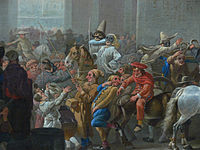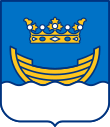
Carnival or Shrovetide is a festive season that occurs at the close of the Christian pre-Lenten period, consisting of Quinquagesima or Shrove Sunday, Shrove Monday, and Shrove Tuesday or Mardi Gras.
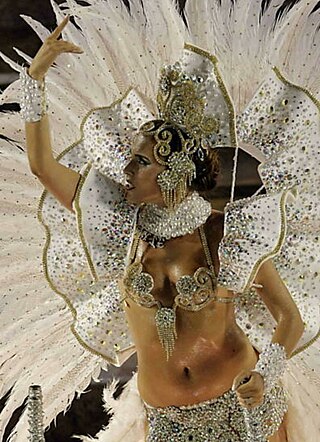
The Carnival of Brazil is an annual festival held the Friday afternoon before Ash Wednesday at noon, which marks the beginning of Lent, the forty-day period before Easter. During Lent, Roman Catholics and some other Christians traditionally abstained from the consumption of meat and poultry, hence the term "carnival", from carnelevare, "to remove meat."

A samba school is a dancing, marching, and drumming club. They practice and often perform in a huge square-compounds and are devoted to practicing and exhibiting samba, an Afro-Brazilian dance and drumming style. Although the word "school" is in the name, samba schools do not offer instruction in a formal setting. Samba schools have a strong community basis and are traditionally associated with a particular neighborhood. They are often seen to affirm the cultural validity of the Afro-Brazilian heritage in contrast to the mainstream education system, and have evolved often in contrast to authoritarian development. The phrase "escola de samba" is popularly held to derive from the schoolyard location of the first group's early rehearsals. In Rio de Janeiro especially, they are mostly associated with poor neighborhoods ("favelas"). Samba and the samba school can be deeply interwoven with the daily lives of the shanty-town dwellers. Throughout the year the samba schools have various happenings and events, most important of which are rehearsals for the main event which is the yearly carnival parade. Each of the main schools spend many months each year designing the theme, holding a competition for their song, building the floats and rehearsing. It is overseen by a carnavalesco or carnival director. From 2005, some fourteen of the top samba schools in Rio have used a specially designed warehouse complex, the size of ten football pitches, called Samba City to build and house the elaborate floats. Each school's parade may consist of about 3,000 performers or more, and the preparations, especially producing the many different costumes, provide work for thousands of the poorest in Brazilian society. The resulting competition is a major economic and media event, with tens of thousands in the live audience and screened live to millions across South America.
Samba-enredo, also known as samba de enredo, is a sub-genre of modern samba made specifically by a samba school for the festivities of Brazilian Carnival. It is a samba style that consists of a lyric and a melody created from a summary of the theme chosen as the plot of a samba school.

The Carnival in Rio de Janeiro is a festival held every year before Lent; it is considered the biggest carnival in the world, with two million people per day on the streets. The first Carnival festival in Rio occurred in 1723.

Bahian Carnival is the annual carnival festival celebrated in the Brazilian state of Bahia, mainly in its capital, Salvador. The event officially lasts for six days, beginning on the Thursday before Ash Wednesday and concluding on Ash Wednesday at noon. The term may also be used to comprise related events that happen immediately before or after, extending the duration for up to twelve days.

The Grêmio Recreativo Escola de Samba Portela or Portela for short, is a traditional samba school, founded in 1923, in Rio de Janeiro, Brazil. The school has the highest number of wins in the top-tier Rio parade, with 22 titles in total, including the 2017 Carnival parade.
The Grêmio Recreativo Escola de Samba Beija-Flor is a Samba school headquartered in the municipality of Nilópolis, Baixada Fluminense, in the state of Rio de Janeiro, Brazil.
The Grêmio Recreativo Escola de Samba Acadêmicos do Grande Rio is a samba school of the Special Group of the carnival of the city of Rio de Janeiro, being headquartered on Almirante Barroso street in Duque de Caxias.

The Paris Carnival is an annual festival held in Paris, France. The carnival occurs after the Feast of Fools and has been held since the 16th century or earlier, with a long 20th century interregnum.

Rosa Lúcia Benedetti Magalhães is a Brazilian professor and artist. She is best known as the most successful carnival designer in Rio de Janeiro, with six championships won since 1984, when the Sambadrome Marquês de Sapucaí was built. Designing carnival parades since 1971, Rosa likes telling historic events in her designs, such as the discovery of Brazil (2000), the life and creations of Hans Christian Andersen (2005), Don Quixote (2010), and the corruption scandal that led to the construction of the Versailles Palace in France (2017).
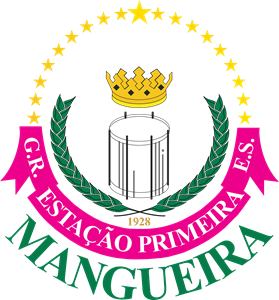
Grêmio Recreativo Escola de Samba Estação Primeira de Mangueira, or simply Mangueira, is a samba school in Rio de Janeiro, Brazil. The school was founded on April 28, 1928, by Carlos Cachaça, Cartola, Zé Espinguela, among others. It is located at the Mangueira neighborhood, near the region of Maracanã.
The Grêmio Recreativo Escola de Samba União da Ilha do Governador was founded on March 7, 1953 by the friends Maurício Gazelle, and Quincas Orphylo, who were in Cacuia, the main site of the carnival parade of the Ilha do Governador, watching the presentation of small schools of samba and blocks of various districts of the island. It was then decided that the neighborhood of Cacuia should be represented by a samba school. Currently, the school is based in Estrada do Galeão in the neighborhood of Cacuia.
The Grêmio Recreativo Escola de Samba Acadêmicos da Rocinha is a samba school in Rio de Janeiro, located in the neighborhood of São Conrado on Bertha Lutz street.

Grêmio Recreativo Escola de Samba Unidos de Vila Isabel is a samba school in Rio de Janeiro. It was thrice champion of the Special Group and is currently headquartered in Boulevard 28 de Setembro in Vila Isabel.

The Brazilica Festival is the largest celebration of Brazilian culture in the United Kingdom that has been held annually in Liverpool, England since July 2008. It is produced by the Liverpool Carnival Company, an organisation that has operated as a registered charity since 2007. The festival began during Liverpool's reign as European Capital of Culture in 2008 when a Rio-style Carnival Parade swept through the streets of the city. In its current format, the festival consists of a week-long celebration of Brazilian culture including music, art, food, film and dance events that take place at indoor venues across the city which build up to an outdoor city centre carnival street party that takes place in Williamson Square and samba carnival parade.

The Torcida Jovem are a torcida organizada, or supporters' group, for Santos FC, a Brazilian professional football club based in Santos, Brazil. Founded in 1969 by a group of fans from São Paulo, the group set out to make it a goal to attend every match that the club played in the capital of São Paulo. With over 70,000 members, it is one of the largest supporting groups in Brazil. The current president is André Vinícius "Deko". Grêmio Recreativo Cultural Social Escola de Samba Torcida Jovem, popularly known simply as Torcida Jovem, is a samba school from São Paulo, Brazil.
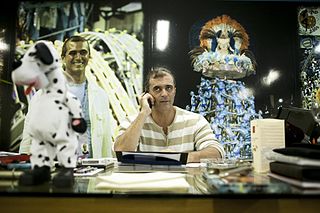
Paulo Roberto Barros Braga is a Brazilian carnavalesco, or carnival planner. He is two-time winner of the samba school title at the Rio Carnival, and has also trained circus artists and army soldiers as performers. He has been compared to Fernando Pinto and Arlindo Rodrigues.

The Carnival of São Paulo is a major Brazilian Carnival. It features a parade of Samba schools and takes place in the Anhembi Sambadrome of São Paulo on the Friday and Saturday night of the week of Carnival. It is currently considered one of Brazil's biggest and most important popular events.

Carnival of Ovar is a major Portuguese tourist event that takes place in Ovar, in the Aveiro Region.
















